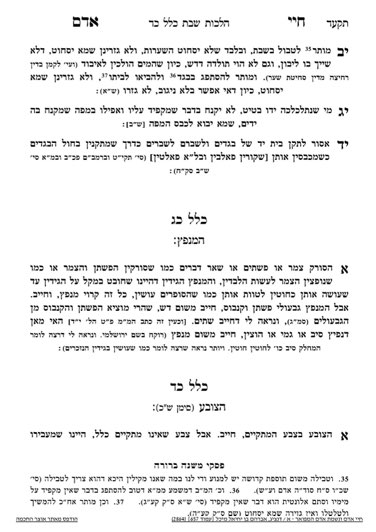We have finished siman 12, which discussed using the mikvah on Shabbos. At the end of the siman, the Chayei Adam refers the learner to the halachos of rechitzah. There, the Chayei Adam explains that Chazal instituted an issur of bathing on Shabbos. This issur was not borne out of concern for sechita, but out of concern that the bathhouse attendants would heat the water of the bathhouse. Therefore, Chazal limited the halachos of rechitzah on Shabbos.
Even in scenarios which Chazal did not prohibit, there is a minhag from the rishonim to further limit certain types of rechitzah. According to one explanation, the reason for this minhag is concern that one will perform sechita. However, it is important to recognize that if these further limits are from the rishonim, it means the original limits imposed by Chazal were not out of concern for sechita. Therefore, the Chayei Adam wrote at the beginning of the siman that it is muttar to use the mikvah and dry oneself, and Chazal were not concerned for sechita. The Mishnah Berurah points out that it is preferable to use a garment which a person will not be concerned about if it gets wet, as we discussed .
In siman 13, the Chayei Adam writes that if one got their hands dirty, they should not wipe the dirt onto a garment which they are makpid about getting dirty, out of concern that they will come to wash the garment and transgress melabein. It is similar to the idea that we learned that one should not place a garment in a place where it will get dusty, out of concern it will bother them and they will come to remove the dust (s583). We discussed the example of placing a black hat on a shelf which is full of dust. Although it is muttar for sephardim to remove the dust, it would be assur mideoraysa for ashkenazim to remove the dust.
In siman 14, the Chayei Adam discusses the process they used to wash garments which included starch. Since it is no longer so practical, we will skip it, but we will discuss some practical applications to tablecloths before moving on to the next klal, be’ezras Hashem.
Summary
- Due to a number of potential problems, one should not go to the mikvah on Shabbos unless it is necessary, such as for tumas niddah. These concerns include concerns from Chazal and, much later, the rishonim, with the latter concerned for sechita. Nevertheless, when it is necessary, it was not made assur.
- Preferably, one should use a towel or garment which they do mind getting wet.
- One should not wipe their hands on a garment which they are makpid about getting dirty, out of concern they will come to wash it.



